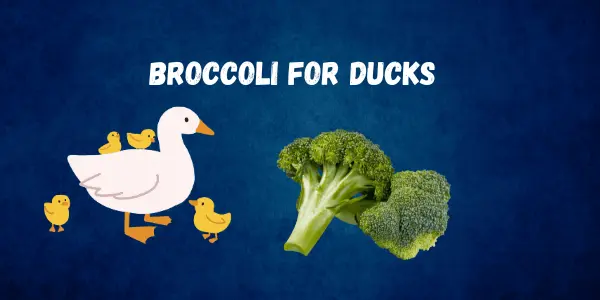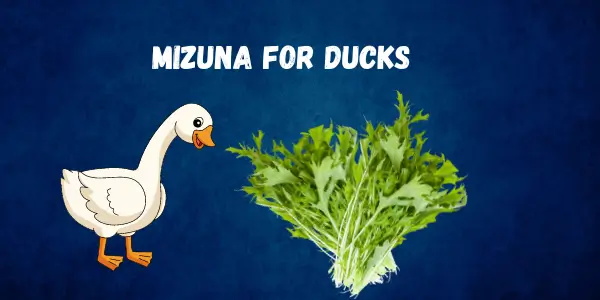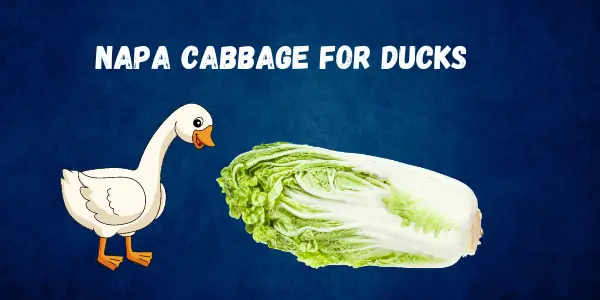Can Ducks Eat Cauliflower? Nutritional Facts and Feeding Guide
Published: 11 Sep 2024
Cauliflower is a common vegetable in many households, but can ducks eat it safely? Ducks are omnivorous birds that consume a variety of plants, grains, and small insects. While cauliflower can be included in their diet, it should be given in moderation.
This guide covers the safety of feeding cauliflower to ducks, its nutritional benefits, and the best ways to prepare it.
Can Ducks Eat Cauliflower – Is Cauliflower Safe for Ducks?
Yes, ducks can eat cauliflower. It is a non-toxic vegetable that provides essential vitamins and minerals. However, cauliflower contains oxalic acid, which can interfere with calcium absorption if consumed in large amounts. This can lead to weaker eggshells in laying ducks.
To keep ducks healthy, cauliflower should be an occasional treat rather than a primary food source. A balanced diet that includes duck pellets, leafy greens, grains, and occasional vegetables ensures proper nutrition.

Can Ducks Eat Raw Cauliflower? – Should You Feed Ducks Raw
Ducks can eat raw cauliflower, but it should be given in small, manageable pieces. Whole cauliflower or large chunks can be difficult for ducks to chew and digest. Chopping the vegetable into small pieces makes it easier to eat.
Raw cauliflower is fibrous, which may be challenging for young ducklings to digest. For ducklings, softer foods like finely chopped greens or mashed vegetables are preferable.
Nutritional Benefits of Raw Cauliflower for Ducks
Raw cauliflower contains several nutrients beneficial for ducks:
- Vitamin C – Supports the immune system and helps ducks fight infections.
- Vitamin K – Aids in blood clotting and bone health.
- Fiber – Promotes digestive health and prevents constipation.
- Antioxidants – Help reduce inflammation and support overall well-being.
Although these nutrients are beneficial, cauliflower lacks protein and essential fats needed for duck growth and energy. It should be a supplement rather than a staple in their diet.
Can Ducks Eat Cooked Cauliflower? – Does Cooking Affect Nutrients in Cauliflower?
Cooking cauliflower slightly reduces its fiber content, making it easier for ducks to digest. However, the cooking process can also decrease some heat-sensitive nutrients, such as vitamin C. Steaming is the best cooking method, as it retains most nutrients while softening the vegetable.
Ducks should not be fed cauliflower that has been cooked with oil, butter, salt, or seasoning. These additives can be harmful to their digestive system.
How to Prepare Cooked Cauliflower for Ducks?
- Steam or boil cauliflower until soft but not mushy.
- Let it cool before serving to prevent burns.
- Chop into small pieces to make it easier for ducks to eat.
- Mix with other vegetables like carrots or leafy greens for variety.
Cooked cauliflower is a safe option for ducks, especially for younger birds that may struggle with raw, fibrous vegetables. However, it should still be fed in moderation alongside a balanced diet.
Can Ducks Eat Cauliflower Leaves and Greens?
Yes, ducks can eat cauliflower leaves and greens. These parts of the plant are often more nutritious than the cauliflower head itself. They contain essential vitamins and minerals that support duck health. However, just like with the florets, moderation is key to maintaining a balanced diet.
Do Ducks Eat Cauliflower Leaves in the Wild?
Wild ducks have a varied diet that includes aquatic plants, seeds, and small insects. If they come across cauliflower plants, they may nibble on the leaves. However, their diet in nature is more diverse, which prevents overconsumption of any single vegetable.
Domestic ducks, on the other hand, rely on their owners to provide a balanced diet. Offering cauliflower leaves occasionally, alongside other leafy greens like lettuce or kale, ensures they receive a mix of nutrients.
Are Cauliflower Greens Nutritious for Ducks?
Cauliflower greens contain beneficial nutrients, including:
- Vitamin A – Supports vision and immune health.
- Calcium – Strengthens bones and eggshells in laying ducks.
- Fiber – Aids in digestion and promotes gut health.
- Antioxidants – Help reduce inflammation and support overall well-being.
While cauliflower leaves are safe, they should be washed thoroughly before feeding. Pesticides and chemicals used in farming can be harmful to ducks.
Can Ducklings Eat Cauliflower? – Is Cauliflower Safe for Baby Ducks?
Ducklings can eat cauliflower, but it should be given in small amounts. Their digestive systems are still developing, and fibrous vegetables like cauliflower can be harder to process. Soft foods, like duck starter feed, chopped greens, and small amounts of vegetables, are better suited for young ducks.
Cauliflower should never replace high-protein foods in a duckling’s diet. Protein is crucial for healthy growth and feather development.
How to Introduce Cauliflower to Ducklings?
- Chop it finely – Small, soft pieces are easier for ducklings to eat.
- Mix with other soft foods – Combining cauliflower with leafy greens or softened duck pellets can make it more appealing.
- Monitor digestion – If ducklings show signs of digestive discomfort, reduce or eliminate cauliflower from their diet.
For the first few weeks, ducklings should primarily eat starter feed. Vegetables can be introduced gradually as they grow.
Can Ducks Eat Frozen Cauliflower?
Frozen cauliflower is not ideal for ducks unless properly thawed. Cold or frozen foods can be difficult for ducks to digest and may cause discomfort, especially in colder weather.
Thawing Frozen Cauliflower Before Feeding
If you plan to feed ducks frozen cauliflower, follow these steps:
- Let it thaw completely at room temperature.
- Avoid microwaving as it can create hot spots that might burn the duck’s mouth.
- Chop into small pieces for easy consumption.
Thawed cauliflower retains most of its nutrients and is easier for ducks to eat than frozen chunks.
Risks of Feeding Ducks Cold or Frozen Vegetables
- Digestive issues – Cold food can be hard for ducks to process.
- Reduced appetite – Ducks may reject overly cold vegetables.
- Temperature shock – In winter, feeding frozen foods may lower a duck’s body temperature, leading to discomfort.
Offering fresh or thawed cauliflower is the best option. It ensures ducks can digest the vegetable properly and get the most nutritional benefits.
Can Ducks Eat Cauliflower Rice?
Cauliflower rice is simply finely chopped cauliflower, making it easier for ducks to eat compared to whole florets. While ducks can consume cauliflower rice, it should be given in moderation as part of a balanced diet.
Is Cauliflower Rice Easier for Ducks to Eat?
Yes, cauliflower rice is easier for ducks to eat and digest due to its small size. Ducks do not chew food like mammals; they swallow food whole. The tiny pieces of cauliflower rice reduce the risk of choking and make digestion smoother.
However, raw cauliflower rice can still be fibrous. If feeding it to ducklings or older ducks with digestive sensitivities, lightly steaming it can make it softer and more digestible.
Does Cauliflower Rice Provide the Same Nutrients?
Cauliflower rice retains the same nutrients as whole cauliflower unless processed with additives. It contains:
- Vitamin C – Supports immune function.
- Fiber – Aids digestion.
- Vitamin K – Helps with blood clotting and bone health.
If store-bought cauliflower rice is used, check for added preservatives, seasonings, or oils. Plain, unprocessed cauliflower rice is the best option for ducks.
Can Ducks Eat Cauliflower Seeds?
Cauliflower seeds are not a common part of a duck’s diet, but they are not toxic. However, they should be given in limited quantities. Large amounts of seeds can be difficult to digest and may not provide much nutritional value compared to other foods.
Are Cauliflower Seeds Safe for Ducks?
Cauliflower seeds are small and hard, making them potentially difficult for ducks to eat. Ducks do not have teeth, so they rely on their gizzard to grind food. Hard seeds may not break down as easily as softer food items.
Additionally, if the seeds have been treated with pesticides or chemicals, they could be harmful. Always ensure seeds are organic and untreated if feeding them to ducks.
How to Feed Cauliflower Seeds to Ducks?
- Crush the seeds – Breaking them into smaller pieces makes them easier to digest.
- Mix with other feed – Combining seeds with grains or duck pellets prevents overconsumption.
- Offer sparingly – Seeds should not be a primary food source, as they lack essential nutrients for duck health.
Can Ducks Eat Cauliflower Bread?
Cauliflower bread is a type of baked product made using cauliflower as a primary ingredient. While ducks can technically eat small amounts of plain cauliflower bread, it is not the best food choice for them.
Does Bread with Cauliflower Affect Duck Health?
Bread, including cauliflower bread, is not nutritionally beneficial for ducks. It contains refined ingredients, such as flour and possibly salt, which provide little to no essential nutrients. Ducks that eat too much bread can develop angel wing, a condition caused by poor nutrition that affects wing development.
If cauliflower bread contains additional ingredients like cheese, garlic, or seasoning, it should be completely avoided, as these can be harmful to ducks.
Should Ducks Be Fed Baked Products?
Ducks should not be fed baked products regularly. Here’s why:
- Low in nutrients – Baked goods do not provide the vitamins and minerals ducks need.
- High in carbohydrates – Excess carbs can lead to obesity in ducks.
- Possible additives – Many bread products contain salt, sugar, or preservatives, which are harmful to ducks.
If you want to give ducks a treat, fresh vegetables, leafy greens, or grains like oats and corn are much healthier options.
Can Ducks Eat Cauliflower and Carrots Together?
Yes, ducks can eat cauliflower and carrots together. Both vegetables offer essential nutrients that support a duck’s health. However, they should be given in moderation and properly prepared to ensure easy digestion.
Best Vegetable Mixes for Ducks
Ducks thrive on a varied diet that includes vegetables, grains, and protein sources. Some of the best vegetable mixes for ducks include:
- Cauliflower and carrots – A great mix of fiber, vitamins, and antioxidants.
- Lettuce and peas – Provides hydration and protein.
- Broccoli and spinach – Rich in iron and vitamins.
When feeding ducks mixed vegetables, always chop them into small, manageable pieces. Raw vegetables should be fresh and free from pesticides. Cooked vegetables should be plain and unseasoned.
Nutritional Benefits of Combining Cauliflower and Carrots
Cauliflower and carrots each offer unique nutrients:
- Cauliflower: High in vitamin C, fiber, and antioxidants.
- Carrots: A good source of vitamin A, which supports eye health and immunity.
Together, they provide a well-balanced combination of vitamins and minerals. Carrots add a natural sweetness that makes the mix more appealing to ducks. However, avoid overfeeding, as too much fiber can lead to digestive issues.
Can Ducks Have Broccoli and Cauliflower in Their Diet?
Ducks can eat both broccoli and cauliflower as part of a balanced diet. These cruciferous vegetables contain essential vitamins and minerals but should be given in moderation due to their fibrous nature.
Are These Cruciferous Vegetables Safe for Ducks?
Yes, both broccoli and cauliflower are safe for ducks if prepared correctly. They should be:
- Chopped into small pieces to prevent choking.
- Fed in moderation to avoid bloating caused by excessive fiber.
- Cooked lightly (if needed) to soften the texture for easier digestion.
Avoid giving ducks broccoli or cauliflower that has been cooked with salt, butter, or spices, as these can be harmful.
Health Benefits of Broccoli and Cauliflower for Ducks
Both vegetables offer significant health benefits:
- Broccoli: Contains vitamin K, calcium, and antioxidants, which support bone strength and immune health.
- Cauliflower: Provides fiber and vitamin C, promoting digestion and feather health.
Feeding ducks a mix of these vegetables occasionally can contribute to their overall nutrition. However, they should not replace a duck’s main diet of grains, duck pellets, and natural greens.
Can Ducks Eat Cauliflower in the Winter?
Ducks can eat cauliflower in the winter, but their nutritional needs change during colder months. They require more energy-rich foods to maintain body heat and stay healthy. While cauliflower is a good source of vitamins, it should be supplemented with higher-calorie foods in winter.
Seasonal Feeding Considerations for Ducks
In winter, ducks need:
- More protein and fat to stay warm.
- Easy-to-digest foods since cold temperatures slow digestion.
- Fresh, non-frozen vegetables to prevent cold-related digestive issues.
Cauliflower should be served fresh or lightly steamed in winter. Avoid feeding frozen cauliflower directly, as it can lower a duck’s body temperature.
Alternative Winter Foods for Ducks
To help ducks stay healthy in cold weather, consider adding these to their diet:
- Corn and oats – High in energy and easy to digest.
- Leafy greens – Provide essential vitamins.
- Mealworms or insects – Boost protein intake for warmth.
Cauliflower can be part of a duck’s winter diet, but it should not be the main food source. Offering a mix of high-energy grains, vegetables, and proteins ensures ducks stay warm and well-fed.
Will Ducks Eat Cauliflower Voluntarily?
Ducks may or may not eat cauliflower voluntarily, depending on their taste preferences and familiarity with the vegetable. Some ducks readily consume cauliflower, while others may ignore it in favor of familiar foods like grains and leafy greens.
Observing Duck Preferences for Vegetables
Ducks generally prefer soft, moist foods that are easy to peck and swallow. While some ducks enjoy cauliflower, others might be hesitant to eat it due to its texture or mild flavor. To determine if your ducks like cauliflower:
- Offer small, chopped pieces and observe their response.
- Try raw and cooked variations to see which they prefer.
- Monitor their eating habits over a few days before deciding whether to continue feeding it.
Encouraging Ducks to Try Cauliflower
If ducks don’t show immediate interest in cauliflower, try these strategies:
- Mix it with their favorite foods, such as grains or leafy greens.
- Offer small, manageable pieces to make it easier to eat.
- Cook it lightly to soften the texture while keeping nutrients intact.
Patience is key. Some ducks take time to accept new foods, while others may never develop a taste for cauliflower.
How to Prepare and Feed Cauliflower to Ducks?
Proper preparation ensures that cauliflower is safe and nutritious for ducks.
Proper Serving Size and Frequency
Cauliflower should only be a small part of a duck’s diet. Overfeeding can cause digestive discomfort due to its fiber content. Recommended feeding guidelines:
- Small amounts – A few bite-sized pieces per duck at a time.
- 1-2 times per week – To prevent digestive upset and maintain dietary balance.
- Always fresh or properly cooked – Avoid spoiled or moldy cauliflower.
Mixing Cauliflower with Other Foods for Balanced Nutrition
To enhance nutrition and encourage ducks to eat cauliflower, mix it with other safe foods:
- Leafy greens (lettuce, kale, spinach) – Boosts vitamin content.
- Grains (oats, barley, corn) – Provides energy and variety.
- Protein sources (mealworms, peas, duck pellets) – Ensures balanced nutrition.
Mixing cauliflower with these foods can improve its appeal and make it part of a well-rounded diet.
Conclusion: Should You Feed Ducks Cauliflower?
Cauliflower is a safe and nutritious treat for ducks when fed in moderation. It provides essential vitamins and fiber but should not replace staple foods like grains and leafy greens. Some ducks enjoy cauliflower, while others may refuse it. Proper preparation, including chopping it into small pieces and mixing it with other vegetables, can make it more appealing.

- Be Respectful
- Stay Relevant
- Stay Positive
- True Feedback
- Encourage Discussion
- Avoid Spamming
- No Fake News
- Don't Copy-Paste
- No Personal Attacks

- Be Respectful
- Stay Relevant
- Stay Positive
- True Feedback
- Encourage Discussion
- Avoid Spamming
- No Fake News
- Don't Copy-Paste
- No Personal Attacks





